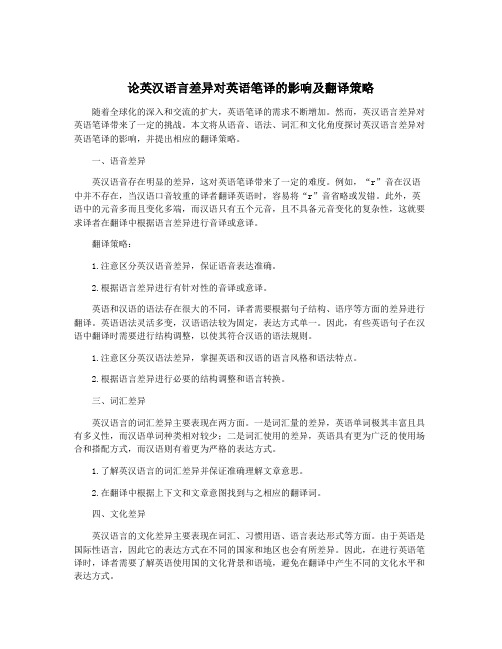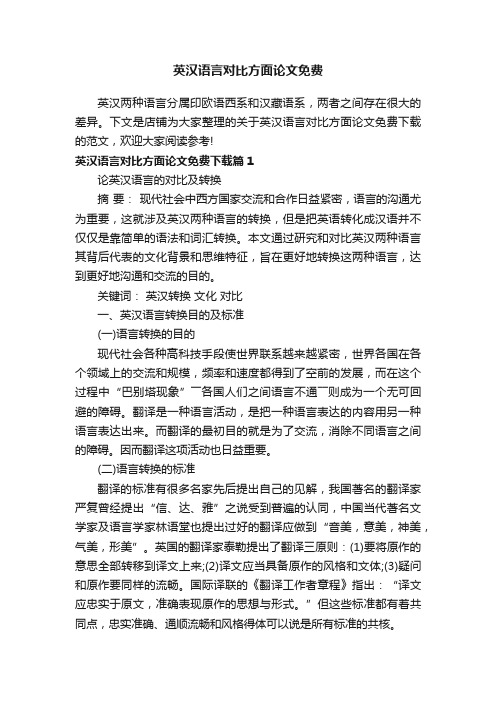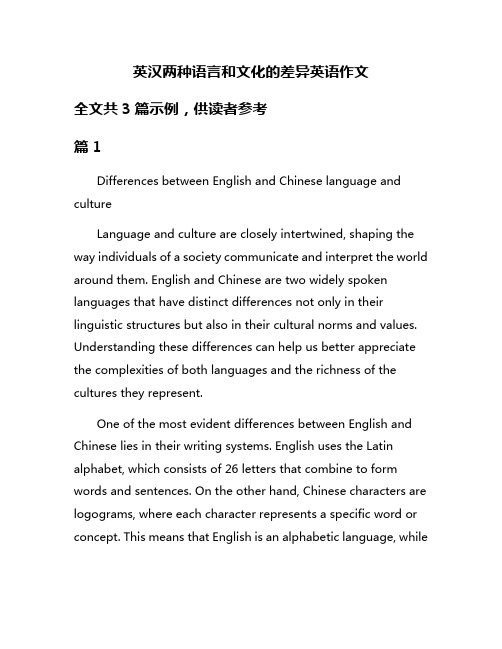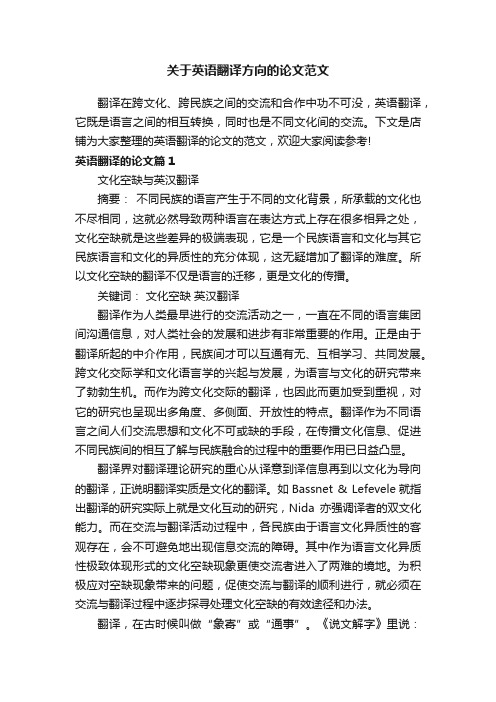从英汉语言文化差异谈翻译论文
英语论文-从中英文化差异谈英语隐喻的汉译

从中英文化差异谈英语隐喻的汉译[Abstract] In recent years, more and more scholars have made researches on metaphor and an “upsurge of metaphor” has been formed gradually in modern society. The studies on metaphor in foreign countries have developed a complete system, which is typically represented by George Lakeoff and Mark Johnson. And the studies on metaphor in China are also influenced by the two. However, if surveying these research achievements, we will easily find that few of them study the translation of metaphor from English into Chinese. Moreover, most traditional theorists believe that metaphor is only a figure of speech and belongs to the category of linguistics. But in fact, metaphor is not only a linguistic phenomenon, but also a cultural and cognitive phenomenon. This thesis breaks these restrictions and try to research into the translation of metaphor from English into Chinese from the perspective of cultural differences between Chinese and English. The whole thesis is divided into five parts. The first part is an introduction. Based on the new belief that metaphor is a cultural and cognitive phenomenon, this part states the significance of studying metaphor from the cultural perspective. The second part focuses on the analysis of the close interrelations between language, culture and translation. The third part introduces some major factors about metaphor, such as its definitions, characteristics and classification. The fourth part emphatically illustrates the approaches to the translation of metaphor from English into Chinese in terms of different corresponding relations between Chinese and English. The last part summarizes the main points of this thesis.[Key Words] metaphor; translation; cultural differences; cultural connotations; corresponding relation【摘要】近年来,越来越多的学者对隐喻进行了研究,在现代社会逐渐形成了一股“隐喻热”。
论英汉语言差异对英语笔译的影响及翻译策略

论英汉语言差异对英语笔译的影响及翻译策略随着全球化的深入和交流的扩大,英语笔译的需求不断增加。
然而,英汉语言差异对英语笔译带来了一定的挑战。
本文将从语音、语法、词汇和文化角度探讨英汉语言差异对英语笔译的影响,并提出相应的翻译策略。
一、语音差异英汉语音存在明显的差异,这对英语笔译带来了一定的难度。
例如,“r”音在汉语中并不存在,当汉语口音较重的译者翻译英语时,容易将“r”音省略或发错。
此外,英语中的元音多而且变化多端,而汉语只有五个元音,且不具备元音变化的复杂性,这就要求译者在翻译中根据语言差异进行音译或意译。
翻译策略:1.注意区分英汉语音差异,保证语音表达准确。
2.根据语言差异进行有针对性的音译或意译。
英语和汉语的语法存在很大的不同,译者需要根据句子结构、语序等方面的差异进行翻译。
英语语法灵活多变,汉语语法较为固定,表达方式单一。
因此,有些英语句子在汉语中翻译时需要进行结构调整,以使其符合汉语的语法规则。
1.注意区分英汉语法差异,掌握英语和汉语的语言风格和语法特点。
2.根据语言差异进行必要的结构调整和语言转换。
三、词汇差异英汉语言的词汇差异主要表现在两方面。
一是词汇量的差异,英语单词极其丰富且具有多义性,而汉语单词种类相对较少;二是词汇使用的差异,英语具有更为广泛的使用场合和搭配方式,而汉语则有着更为严格的表达方式。
1.了解英汉语言的词汇差异并保证准确理解文章意思。
2.在翻译中根据上下文和文章意图找到与之相应的翻译词。
四、文化差异英汉语言的文化差异主要表现在词汇、习惯用语、语言表达形式等方面。
由于英语是国际性语言,因此它的表达方式在不同的国家和地区也会有所差异。
因此,在进行英语笔译时,译者需要了解英语使用国的文化背景和语境,避免在翻译中产生不同的文化水平和表达方式。
1.了解英语使用国的文化背景和语境,避免产生文化误解。
2.在翻译中选择与文化背景和语境相符的表达方式。
总之,作为翻译者,我们需要尽可能地了解英汉语言的差异,以便在英语笔译中找到最合适的翻译策略。
论文英汉文化差异对翻译的影响

论文英汉文化差异对翻译的影响摘要:由于英汉文化之间存在差异,翻译工作会受到很大的影响。
本文从语言、思维方式和文化背景三个方面分析了英汉文化差异对翻译的影响,并提出了相应的解决方法。
关键词:文化差异、翻译、语言、思维方式、文化背景一、引言翻译是将一种语言文字转化为另一种语言文字的过程。
而由于不同地区和国家的文化差异,英汉之间的翻译工作具有一定的难度。
本文将分析英汉文化差异对翻译的影响,并提出相应的应对方法。
二、英汉文化差异对翻译的影响1. 语言差异英文和汉语在词汇、语法和表达方式上存在差异。
在翻译过程中,翻译人员需要根据原文的语言特点选择合适的词汇和表达方式,以使译文更符合目标语言的语言习惯。
2. 思维方式差异英汉文化存在着不同的思维方式。
英语注重逻辑推理和精确性,而汉语注重细腻的表达和情感色彩。
在翻译中,翻译人员需要根据目标语言的思维方式,将原文的意思转化为与之相符的表达方式。
3. 文化背景差异英汉文化背景差异较大,在宗教、历史、习俗等方面存在差异。
翻译人员在进行翻译时需要对目标语言的文化背景有一定的了解,以便更好地传达原文的意义和文化内涵。
三、解决方法1. 增加语言学习翻译人员需要增加对目标语言的学习,深入了解其词汇、语法和表达方式,以便更好地进行翻译工作。
2. 加强文化研究翻译人员需要深入研究目标语言的文化背景,了解其宗教、历史和习俗等方面的差异,以便更好地传达原文的含义和文化内涵。
3. 灵活运用翻译技巧翻译人员需要根据具体情况,灵活运用翻译技巧,选择合适的词汇和表达方式,以使译文更符合目标语言的语言习惯和文化背景。
四、结论英汉文化差异对翻译具有一定的影响。
翻译人员应增加语言学习,加强文化研究,并灵活运用翻译技巧,以便更好地进行翻译工作。
同时,也需要世界各国的翻译人员加强合作,共同促进跨文化交流。
英汉文化差异与翻译论文

论英汉文化差异与翻译摘要:从五个方面探讨了英汉文化差异与翻译的关系。
在翻译时,认识到文化差异对翻译所起的至关重要的作用,才能更好地再现原文的文字信息与文化因素。
关键词:文化差异;翻译引言翻译是运用一种语言把另一种语言所表达的思维内容准确而完整地表达出来的语言活动。
人类的共性决定各民族语言文化间的共性,因此文化差异对翻译的影响不可忽视。
这里特从以下几个方面谈谈理解文化差异对翻译所起的至关重要的作用。
一、地理环境和气候的差异与翻译从某种程度上说,不同的地理环境影响了生产方式的不同选择。
在中国牛耕是主要的耕作方式,因此汉语中有很多词和牛有关。
英国虽然是一个岛国,但古时主要以马为耕作工具。
牛和马在两国生产中的重要作用在各自的语言表达上很清楚地表现出来。
例如汉语中说“吹牛”,翻译成英语就成了“talk horse”;汉语中的“牛饮”到了英语中就变成了“drink like a horse”。
由于我国西依高山、东临大海的地理环境,故素有“东风”、“送暖”、“西风凛冽”之辞。
与此相反,在英国,east wind是指从欧洲大陆北部袭来的寒冷的风,给英国人带来的是不愉快的感觉。
英国是一个岛国, 历史上航海业一度领先世界;而汉民族在亚洲大陆生活繁衍,人们的生活离不开土地。
比喻花钱浪费,大手大脚,英语是“spend money like water”,而汉语是“挥金如土”。
英语中有很多关于船和水的习语, 而汉语中没有完全相同的对应习语, 如to rest on one’s oars(暂时歇一歇)、to keep one’s head above water(奋力图存)、all at sea(不知所措)、when the ship comes home(等到有钱时)等等。
二、英汉逻辑思维与认知的差异与翻译著名翻译家傅雷认为在哲学上,汉民族主張“天人合一”、“物我交融”、“和谐”、“悟性”,对事物不讲究分析,重视个人分析,重视个人感受和心领神会;而西方哲学则主張“人物分立”,重形式论证和逻辑推理。
英汉语言对比方面论文免费

英汉语言对比方面论文免费英汉两种语言分属印欧语西系和汉藏语系,两者之间存在很大的差异。
下文是店铺为大家整理的关于英汉语言对比方面论文免费下载的范文,欢迎大家阅读参考!英汉语言对比方面论文免费下载篇1论英汉语言的对比及转换摘要:现代社会中西方国家交流和合作日益紧密,语言的沟通尤为重要,这就涉及英汉两种语言的转换,但是把英语转化成汉语并不仅仅是靠简单的语法和词汇转换。
本文通过研究和对比英汉两种语言其背后代表的文化背景和思维特征,旨在更好地转换这两种语言,达到更好地沟通和交流的目的。
关键词:英汉转换文化对比一、英汉语言转换目的及标准(一)语言转换的目的现代社会各种高科技手段使世界联系越来越紧密,世界各国在各个领域上的交流和规模,频率和速度都得到了空前的发展,而在这个过程中“巴别塔现象”――各国人们之间语言不通――则成为一个无可回避的障碍。
翻译是一种语言活动,是把一种语言表达的内容用另一种语言表达出来。
而翻译的最初目的就是为了交流,消除不同语言之间的障碍。
因而翻译这项活动也日益重要。
(二)语言转换的标准翻译的标准有很多名家先后提出自己的见解,我国著名的翻译家严复曾经提出“信、达、雅”之说受到普遍的认同,中国当代著名文学家及语言学家林语堂也提出过好的翻译应做到“音美,意美,神美,气美,形美”。
英国的翻译家泰勒提出了翻译三原则:(1)要将原作的意思全部转移到译文上来;(2)译文应当具备原作的风格和文体;(3)疑问和原作要同样的流畅。
国际译联的《翻译工作者章程》指出:“译文应忠实于原文,准确表现原作的思想与形式。
”但这些标准都有着共同点,忠实准确、通顺流畅和风格得体可以说是所有标准的共核。
二、英汉语言对比(一)主语与主题中国传统哲学主张“天人合一”,反映在语言上就是施事主体可以蕴含在行为事件的主观表现中。
因此在句子构造中,汉语并不把主语看成必要的成分,多为无主语而重主题的形式。
而英语则是注重主语的语言,造句离不开主语。
英汉两种语言和文化的差异英语作文

英汉两种语言和文化的差异英语作文全文共3篇示例,供读者参考篇1Differences between English and Chinese language and cultureLanguage and culture are closely intertwined, shaping the way individuals of a society communicate and interpret the world around them. English and Chinese are two widely spoken languages that have distinct differences not only in their linguistic structures but also in their cultural norms and values. Understanding these differences can help us better appreciate the complexities of both languages and the richness of the cultures they represent.One of the most evident differences between English and Chinese lies in their writing systems. English uses the Latin alphabet, which consists of 26 letters that combine to form words and sentences. On the other hand, Chinese characters are logograms, where each character represents a specific word or concept. This means that English is an alphabetic language, whileChinese is logographic, which influences the way speakers of each language process information and express themselves.Another key difference between English and Chinese is the grammatical structure. English has a subject-verb-object (SVO) word order, where the subject typically comes before the verb and the object after the verb. In contrast, Chinese has asubject-object-verb (SOV) word order, where the subject precedes the object and the verb comes last. This structural difference can lead to misunderstandings and confusion when speakers of one language attempt to translate into the other.Cultural differences also play a significant role in shaping the languages of English and Chinese. English-speaking culturestend to value individualism, independence, and direct communication. This is reflected in the English language, which places a strong emphasis on the use of personal pronouns and straightforward expressions. In contrast, Chinese culture values collectivism, harmony, and indirect communication. Chinese speakers are more likely to use honorifics and polite language to show respect and maintain social harmony.The concept of “face” is another cultural difference that influences the w ay languages are used. In Chinese culture, “face” refers to one's social standing and reputation, which must bemaintained and protected at all costs. This concept is reflected in the Chinese language through the use of polite forms of address and deferential language when speaking to elders or authority figures. In English-speaking cultures, “face” is less emphasized, and individuals are more likely to express their opinions and emotions openly.Food and dining customs are another area where English and Chinese cultures diverge. English cuisine is diverse and often includes meat dishes, dairy products, and baked goods. Meals are typically served in courses, with each dish highlighted for its flavors and textures. In contrast, Chinese cuisine tends to be more communal, with dishes served family-style and shared among diners. Chinese food often features rice or noodles as staples, along with a variety of vegetables, tofu, and meats cooked in flavorful sauces.In conclusion, the differences between English and Chinese language and culture are vast and varied, reflecting the unique histories, values, and customs of each society. By understanding and appreciating these differences, we can develop a greater sense of cultural awareness and empathy towards others. Language and culture are dynamic and ever-changing, and it is essential to approach them with an open mind and a willingnessto learn. Only then can we truly bridge the divide between different languages and cultures and foster mutual understanding and respect.篇2Differences Between English and Chinese Language and CultureLanguage and culture are deeply intertwined aspects of human society. Comparing English and Chinese, two vastly different languages and cultures, can offer valuable insights into the way people communicate, think, and view the world. In this essay, we will explore the differences between English and Chinese language and culture, focusing on various aspects such as grammar, vocabulary, writing systems, and cultural values.Grammar Differences:One of the significant differences between English and Chinese lies in their grammatical structures. English is an alphabetic language, with a subject-verb-object word order. It uses tenses, articles, and plural forms to convey precise meanings. In contrast, Chinese is a logographic language, with a subject-predicate-object word order. It uses tones, particles, and classifier words to convey nuances of meaning. For example,while English uses plural forms like 's' or 'es' to indicate multiple objects, Chinese uses measure words to count specific objects.Vocabulary Differences:English and Chinese also have different vocabularies due to their unique historical and cultural backgrounds. English has a rich blend of words borrowed from various languages, such as Latin, French, and German. Chinese, on the other hand, has a vast number of characters representing meanings, ideas, and concepts. While English has fewer characters, Chinese has a complex system of radicals, strokes, and character components. This leads to differences in word formation, syllable structure, and pronunciation.Writing System Differences:Another key distinction between English and Chinese is their writing systems. English uses the Latin alphabet, with 26 letters and a set of rules for spelling and pronunciation. Chinese uses characters, with thousands of symbols representing words, phrases, and idioms. Each Chinese character has its own unique stroke order, radical position, and pronunciation. Learning to write Chinese characters requires memorization, practice, and repetition, unlike English letters, which can be learned through phonics and sounds.Cultural Values Differences:English and Chinese cultures also have different values, beliefs, and practices that influence language use and communication styles. English-speaking countries often prioritize individualism, autonomy, and self-expression. In contrast, Chinese-speaking countries prioritize collectivism, harmony, and social relationships. This leads to differences in tone, politeness, and indirectness in communication. For example, English speakers may use direct language to express opinions, while Chinese speakers may use indirect language to avoid conflict.In conclusion, the differences between English and Chinese language and culture are vast and complex, reflecting the unique histories, traditions, and worldviews of their respective societies. Understanding these differences can help bridge communication gaps, foster intercultural understanding, and promotecross-cultural exchange. By appreciating the richness and diversity of both languages and cultures, we can enhance our global awareness, empathy, and respect for one another.篇3Differences between English and Chinese Language and CultureLanguage and culture are two inseparable elements that shape the identity of a group of people. When comparing English and Chinese, two of the world's most widely spoken languages, it becomes evident that their differences go beyond vocabulary and grammar. These differences reflect the unique cultural backgrounds of the speakers and have a profound impact on how communication is conducted between them. In this essay, we will discuss some of the key differences between English and Chinese language and culture.One of the most striking differences between English and Chinese is the writing system. English uses an alphabet system with 26 letters, while Chinese uses characters that represent words or syllables. This fundamental difference in writing systems also reflects the different ways in which these languages are structured. English is a phonetic language, meaning that the sounds of the words are represented by letters, while Chinese is a logographic language, where characters represent meanings.Another key difference between English and Chinese is the use of tones in Chinese. In Chinese, the meaning of a word can change depending on the tone in which it is spoken. There arefour tones in Mandarin Chinese (five in some dialects), and mastering these tones is essential for effective communication. In contrast, English does not use tones to differentiate meanings, relying instead on stress and intonation for emphasis.Cultural differences also play a significant role in shaping the languages and communication styles of English and Chinese speakers. For example, Chinese culture places a strong emphasis on hierarchy and respect for authority. This is reflected in the use of honorifics and formal language forms when addressing superiors or elders. In contrast, English-speaking cultures tend to be more egalitarian, with a greater emphasis on individualism and informality in communication.Another cultural difference between English and Chinese is the concept of face. In Chinese culture, maintaining harmony and saving face are important considerations in communication. This can manifest in indirect communication styles and the use of euphemisms to avoid causing offense. In English-speaking cultures, directness and honesty are often valued in communication, even if it means risking conflict or confrontation.Food culture is another area where English and Chinese cultures diverge. Chinese cuisine is known for its diverse flavors and use of fresh ingredients, with an emphasis on balance andharmony. Meals are often shared family-style, with a variety of dishes served at once. In contrast, English cuisine is more traditional and less diverse, with a focus on meat and potatoes. Meals are typically served in courses, with individual portions for each diner.These are just a few examples of the differences between English and Chinese language and culture. While these differences can sometimes lead to misunderstandings and challenges in communication, they also provide opportunities for cross-cultural learning and appreciation. By understanding and respecting the unique qualities of each language and culture, we can foster greater understanding and cooperation between speakers of English and Chinese.。
浅谈英汉习语的文化差异及翻译

浅谈英汉习语的文化差异及翻译习语是每个语言中不可或缺的一部分,也是语言交流中最具挑战性的一部分之一。
在不同的语言间翻译习语是一项很困难的任务,因为往往需要考虑到文化的差异。
英汉两种语言虽然都是很有影响力的语言,但它们之间存在很大的文化差异,这些文化差异深刻地影响了英汉习语的翻译。
一、英汉习语的文化差异1. 礼仪中国人讲究礼仪文化,礼节在交际中是必不可少的。
英国人也很注重礼节这一点,但他们的礼节文化与中国不同。
英国人往往注重个人空间和自由,他们更喜欢直接表达自己的意思,并且在表达时往往比较直白。
相反,中国人在交际过程中更多的是注重礼貌和尽量不给别人带来不便,他们往往更加委婉地表达自己的意思。
2. 观念中西文化差异很大,文化观念和价值观念也各有不同。
虽然中国和英国都很重视友谊和家庭,但他们的观念和文化不同。
中国人在友谊和家庭观念方面更加传统,强调团结和互助,而英国人则更加注重个人情感和独立性。
3. 语言汉语和英语有很大的差别,在翻译英汉习语时,需要考虑到这些语言差异。
汉语的语法结构和英语有许多不同之处,尤其是在表达方式和习语方面。
中文有很多词语和表达方式是英语中无法表达的,所以翻译习语时需要很好地理解两种语言差异。
二、英汉习语的翻译翻译英汉习语需要考虑到文化和语言的差异。
以下是几个要点:1. 了解背景和文化了解什么是习语,它们在不同的文化环境下的含义和使用方式非常重要。
在翻译时,需要了解源语文化和目标语文化之间的区别和异同点。
如果一个人只是单纯将英语翻译成中文,而不了解文化差异的话,就可能会犯很多错误。
2. 选择最合适的方式来翻译习语是一种特殊的语言形式,通常不可直接解释。
因此,在翻译英汉习语时,应该选取最合适的方式来表达信息。
有时候一个习语可能没有完全对应物,那么需要根据语境和背景来判断最合适的翻译方式。
3. 在语境和情景中使用习语通常是在特定的语境和情景下使用的,因此在翻译时需要考虑到这种情况。
关于英语翻译方向的论文范文

关于英语翻译方向的论文范文翻译在跨文化、跨民族之间的交流和合作中功不可没,英语翻译,它既是语言之间的相互转换,同时也是不同文化间的交流。
下文是店铺为大家整理的英语翻译的论文的范文,欢迎大家阅读参考!英语翻译的论文篇1文化空缺与英汉翻译摘要:不同民族的语言产生于不同的文化背景,所承载的文化也不尽相同,这就必然导致两种语言在表达方式上存在很多相异之处,文化空缺就是这些差异的极端表现,它是一个民族语言和文化与其它民族语言和文化的异质性的充分体现,这无疑增加了翻译的难度。
所以文化空缺的翻译不仅是语言的迁移,更是文化的传播。
关键词:文化空缺英汉翻译翻译作为人类最早进行的交流活动之一,一直在不同的语言集团间沟通信息,对人类社会的发展和进步有非常重要的作用。
正是由于翻译所起的中介作用,民族间才可以互通有无、互相学习、共同发展。
跨文化交际学和文化语言学的兴起与发展,为语言与文化的研究带来了勃勃生机。
而作为跨文化交际的翻译,也因此而更加受到重视,对它的研究也呈现出多角度、多侧面、开放性的特点。
翻译作为不同语言之间人们交流思想和文化不可或缺的手段,在传播文化信息、促进不同民族间的相互了解与民族融合的过程中的重要作用已日益凸显。
翻译界对翻译理论研究的重心从译意到译信息再到以文化为导向的翻译,正说明翻译实质是文化的翻译。
如Bassnet & Lefevele就指出翻译的研究实际上就是文化互动的研究,Nida亦强调译者的双文化能力。
而在交流与翻译活动过程中,各民族由于语言文化异质性的客观存在,会不可避免地出现信息交流的障碍。
其中作为语言文化异质性极致体现形式的文化空缺现象更使交流者进入了两难的境地。
为积极应对空缺现象带来的问题,促使交流与翻译的顺利进行,就必须在交流与翻译过程中逐步探寻处理文化空缺的有效途径和办法。
翻译,在古时候叫做“象寄”或“通事”。
《说文解字》里说:“传译四夷之言者。
”《义疏》里也提到:“译即易,谓换易言语使相解也。
- 1、下载文档前请自行甄别文档内容的完整性,平台不提供额外的编辑、内容补充、找答案等附加服务。
- 2、"仅部分预览"的文档,不可在线预览部分如存在完整性等问题,可反馈申请退款(可完整预览的文档不适用该条件!)。
- 3、如文档侵犯您的权益,请联系客服反馈,我们会尽快为您处理(人工客服工作时间:9:00-18:30)。
2.称呼方式近年来,很多说英语的人倾向于用名来称呼别人,这个现象在美国人当中尤其普遍,甚至是初次见面的时候。
这个不仅适用于同龄人,也适用于年龄不同的人。
听到一个小孩称呼一个年龄很大的人为joe, ben, may, helen是很平常的事。
很多大学生直呼他们教授的名字,教授不把这个看作是一种不尊敬或不熟悉,而是把他看作是一种谦恭有礼和平等。
中国人称呼自己的家人、亲戚或近邻为二哥,三姐,四婶,周大伯,而这些不应当被转译成英语。
中国人的称呼方式通常是使用一个人的头衔、办公室、职业等,比如,黄局长、林经理、马校长,但是很少听到说英语的人说“bureau director”, “manager jackson”, “principle morris”。
英汉亲属称谓的文化差异与互译中文摘要语言是文化的载体,称谓不仅是一种语言现象,更是一种文化现象。
英汉语言中亲属称谓的不同,可以说从一个侧面反映了东西方文化的差异。
本文试图从人们较为熟悉的英汉亲属称谓习惯和语义进行比较分析,揭示其中所隐含的文化意蕴。
它们属于不同的称谓制度,具有不同的称谓习惯和泛化现象。
家庭类型、血缘关系、宗法观念、文化取向、礼貌原则等是造成两者文化差异的主要原因。
因此通过对亲属称谓的属性和用法的分析和对比,可以对一个民族的传统文化窥见一斑。
汉英称谓在形式、语用意图、文化内涵上存在诸多差异,通过两种语言称谓系统的归纳对比,挖掘各自的文化内涵,对中英称谓语的翻译提出三种方法。
关键词: 亲属称谓;文化差异;比较;翻译Cultural Differences and Translation between English and Chinese Kinship TermsAbstractLanguage is the carrier of culture, kinship term is not only a part of language but also a kind of culture. The differences between English and Chinese kinship terms reflect the cultural differences between East and West to some extend. From the comparative analys is of usages and meanings of kinship addressing system between Chinese and English which people familiar with,the paper is to reveal the cultural implication in it. They belong to different kinship addressing systems also have different usages of kinship terms and developments. The main reasons for cultural differences lie in the family structure, consanguinity, patriarchy concept, culture adoption and courtesy principle. The comparative analysis of its features and usages can help us to understand the cultural differences between Chinese and English. Based on the great differences in the title and kinship addressing system between Chinese and English, and their complicated pragmatic intentions and cultural implications in use, the paper systematically compares the two systems, and reveals their respective culture specific implications. Finally, three methods are presented on how to translate addressing forms between Chinese and English.Key words: kinship term; cultural difference; comparison; translation语言是文化的载体,称谓不仅是一种语言现象,更是一种文化现象。
英汉语言中亲属称谓的不同,可以说从一个侧面反映了东西方文化的差异。
因此通过对亲属称谓的属性和用法的分析和对比,可以对一个民族的传统文化窥见一斑。
一、英汉亲属称谓的差异(一)、英汉亲属称谓的复杂程度差异汉语亲属称谓复杂,英语简单。
“亲属称谓(Kinship term)是一定的亲属制度(Kinship system)所产生的文化符号,它以简单的术语形式反映复杂的亲属制度。
”[1](P139)汉语称谓语要比英语称谓语繁杂细致得多,汉语要区分血亲姻亲,如伯父、叔父、姨母和伯母、婶母、姨父;区分宗族非宗族,如爷爷、侄儿、孙子和外公、外甥、外孙等;区分父系母系,如叔叔、姑妈、堂兄和舅舅、姨妈、表兄等;区分长幼辈份,如哥哥、姐姐和弟弟、妹妹等。
而英语的亲属称谓就显得简单得多,仅用几个词就能全部涵盖,如grandparent(爷爷,外公,奶奶,外婆),brother(哥哥,弟弟),sister(姐姐,妹妹),uncle(伯父,叔父,姨父,舅舅,姑父),另外,英语中的一些亲属称谓非常笼统,没有指明具体关系。
所以像Linda‟s bother married Michelle‟s sister这句话就很难准确地译成汉语,因为不知道brother是Linda的哥哥还是弟弟,sister是Michelle的姐姐还是妹妹。
还有cousin这个称谓,有时连男女都不分了。
在西方国家,亲属关系的涵盖和延伸范围远没有中国那么广阔。
(二)、英汉亲属称谓关系表达清楚性差异汉语亲属称谓所表达的关系清楚明了,英语笼统。
“家庭是以姻缘关系和血缘关系为纽带组成的一种基本的社会生活共同体.”[2](P34)中国人重亲属称谓,辈份性别指代清楚,本家成员与外姓亲戚从称谓上一目了然。
然而,英美人并无如此清晰明了之差别,仅是本家成员与外姓亲戚在称谓上常混为一谈(如grandfather,uncle,brother-in-law等词语),有时甚至连男女也不分,如cousin一词可指堂兄、堂妹,又可指表兄、表妹。
最为简约的是uncle 与aunt,前者将中国人的伯,叔,舅父,姑父,姨丈等所有与父亲同辈的男性一概统称,后者将伯母,婶母,舅母,姑母,姨母等所有与母亲同辈的女士一词蔽之。
究其原因,是因为在西方文化中对纲常伦理的定义和概念与中国文化有着较大的出入,或者确切点说,是没有像中国传统文化中那样有一套严格繁琐的纲常伦理。
(三)、英汉亲属称谓中敬称和谦称的使用差异汉语有敬称和谦称,而英语没有。
“英汉社交称谓中还有一个特别的差异,应当是敬称与谦称的使用。
英语中虽然同样有敬称,但绝少有谦称,因为西方人崇尚和提倡自信,对人有礼但不过分自谦。
而汉语中谦称与敬称并重, 这一文化现象的产生,无疑也源于中国传统礼教。
…夫礼者, 自卑而尊人‟ (《礼记·典礼》),因而汉语谦称有许多,如: 愚、在下、鄙人、不才、小可、晚辈、未学、后生、卑职、下官等等。
不仅有自谦,而且还代为亲属谦。
如: 小儿、犬子、内子、拙荆、小女、小婿等等。
”[3](P48)汉语里用敬称直接表示敬意,旧时常用,如尊称:令尊、令堂、令公子、令爱、令千金等又用谦称间接表示恭敬,抬高对方,贬低自己,让对方产生优越感.消除压力。
而西方人则崇尚和提倡自信,一方面要对别人有礼貌,另一方面要求自己不卑不亢,过分自谦,反而让人觉得你信心不足,是懦弱的表现。
所以.英语中很少有谦称,相反只有表示上帝的“He”和表示自己的“I”无论在句首句中都是大写.这种擅自代为人谦的情况在西方人看来是不可思议的,西方人强调平等的权利,哪怕对子女、父母也将其当作一个独立人的人来看待,并不认为有支配其的绝对权力。
(四)、英汉亲属称谓中对长辈称呼的差异汉亲属称谓中不可对长辈直呼其名,英语可以。
汉语亲属称谓注重辈分,英语中则辈分淡化,血亲传统分为“九族”上有四代长辈、下有四代晚辈、亲疏有别、长幼有序。
中国文化讲究人际关系,而人际关系的核心就是有序,按中国的伦理观念,传统文化对汉语的称谓起着决定的作用,因此在汉语的亲属称谓中有明显的尊卑、长幼、亲疏之分。
可以说,汉语称谓反映着人伦规范的两大伦理观念:长幼有序、尊卑不同和亲疏不同、内外有别。
在社会和家庭中,语言称谓必须符合说话人的身份和地位。
在汉语中不仅父母的姓名是绝对避讳的,对于长辈或地位高者要用尊称,即使是同辈,也有固定的称谓,不可直呼其名。
“耶稣主张,家庭中的成员平等,他自己就以名字称呼母亲,而且认为子女可以与其父母相争,可以与他们为敌。
因此在英语亲属称谓中没有尊卑之别,同辈之间不论年龄大小,均可直呼其名,以表示亲切友好。
”[4](P86)西方社会组织结构不以等级身份为核心,提倡人人平等。
二、英汉亲属称谓的文化差异因素(一)、家庭类型“亲属称谓的简化,意味着家庭关系在社会生活中不占那么重要的地位;资本主义关系下的家庭,其构成和社会作用完全不同于封建主义关系,在语言中也能找到反映。
”[5](P249)我国长期处于封建社会,社会组织的单元是家庭或家族,因此家族势力非常强大,而在家族内部,宗族内的亲疏关系是严格按等级区分的,内外亲戚,嫡庶区别得很清楚。
为了维护和适应这种层次森严、内外有别的封建家族体系和封建伦理道德,相关的很多称谓就出现了,而且分得特别仔细。
“在英美等国,核心家庭(nuclear family)占主导地位.这种家庭中只有一对夫妇和他们未成年的子女,而且孩子长大后马上离开父母去独立生活,自立门户.因此,他们的家庭成员关系非常简单.他们并不把亲属关系看得那么重。
由于这些亲属不住在一起,没有必要,也不需分得那么清楚。
”[6](P66)这影响了西方社会的称呼语,称谓语相对贫乏。
在这种家庭中,人际关系非常随便、开放,以个人主义观念为核心的自我意识非常明显。
